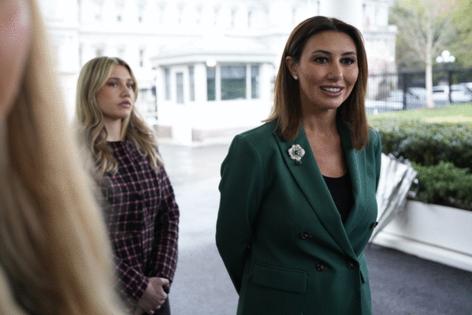NJ criminal cases paused after challenge to top prosecutor's authority
Published in News & Features
The controversy over Alina Habba’s appointment as New Jersey’s top federal prosecutor grew this week as judges paused criminal cases amid a challenge by defendants who say she doesn’t legally hold the job.
Defendants facing narcotics charges are arguing that prosecutors can’t proceed with their case without a “validly appointed” U.S. attorney in charge. The dispute could carry broad implications for criminal cases in New Jersey, and judges began postponing proceedings so that the issue can play out in court.
The Justice Department pushed back Tuesday, saying President Donald Trump followed the law when he tapped Habba last week as her 120-day interim post expired, even though New Jersey’s federal judges selected her top assistant, Desiree Grace, for the job. “Ms. Habba is validly serving as the Acting United States Attorney,” the DOJ said in a court filing.
The dispute in a narcotics case involving Julien Giraud Jr. and Julien Giraud III came amid growing legal uncertainty as to whether Habba or Grace should be New Jersey’s top federal law enforcement officer. The federal judge who had overseen the case in New Jersey said the Girauds raised a “non-frivolous argument.”
“I think you’ll soon find out that other judges are going to stay whatever criminal matters there are pending,” U.S. District Judge Edward Kiel said at a hearing in Camden, New Jersey, on Monday. “You’ll see generally that a lot of judges will not be hearing any criminal cases that are of a non-urgent matter.”
An appellate court judge, Michael Chagares, moved the case to Pennsylvania on Monday, saying the transfer was in the public interest.
U.S. District Judge Matthew Brann, the chief judge in the Middle District of Pennsylvania, held a status conference by phone on Tuesday. He will first decide whether the Girauds deserve any legal relief, such as dismissal of the indictment, if Habba’s appointment is invalid, according to a written order. He directed lawyers to submit written arguments by Wednesday.
Brann will decide the potential impact on the Girauds before deciding whether he’ll take up the question of whether Habba’s appointment violates the law or U.S. constitution, he wrote.
“Fundamentally, my client is entitled to be prosecuted by someone duly appointed,” Thomas Mirigliano, an attorney who represents Julien Giraud Jr., said in an interview before the hearing.
The controversy over Habba stems, in part, from the Senate’s failure to confirm her appointment to a full four-year term. Under U.S. law, federal judges in the district have the authority to appoint a successor to an interim U.S. Attorney if the Senate hasn’t acted on a nomination.
Lorraine Gauli-Rufo, a defense attorney in New Jersey, said judges have paused cases amid the tumult.
“There are many cases that have been put on hold in the District of New Jersey, whether it’s pleas or sentencings,” said Gauli-Rufo. “We’re all trying to figure this out and do the right thing by our clients.”
The Justice Department had previously declined to explain the mechanics of how Habba was appointed last week. In their filing Tuesday, however, the US spelled out some of those details.
Trump withdrew Habba’s nomination to the Senate to serve a four-year term as U.S. attorney on July 24. She then resigned as interim U.S. attorney and Bondi appointed her as a special attorney and also named her first assistant, the post that Grace held. Bondi fired Grace, assailing the “politically minded judges” who appointed her.
Two letters
On July 26, a special assistant to the president, Saurabh Sharma, emailed Grace to say she may not serve as U.S. attorney because the district judges lacked the authority to elevate her. He also said that Bondi had the right to fire her, according to the filing.
That same day, Grace also received another letter from the Executive Office for the United States Attorneys that said she’d been fired.
“You were removed from employment with the District of New Jersey and from federal service,” General Counsel Jay Macklin wrote, according to the filing. “Not only are you no longer employed by the department, but you also will not serve as the United States Attorney.”
The Girauds’ case is set to test the president’s appointment power, but it also demonstrates the implications such fights can have on the court system.
“Even if the government wins on these two issues, we have chaos in the meantime,” Stanford Law School professor Anne Joseph O’Connell said in an email.
The case is US v. Giraud, 24-cr-768, US District Court, District of New Jersey (Camden).
©2025 Bloomberg L.P. Visit bloomberg.com. Distributed by Tribune Content Agency, LLC.







Comments